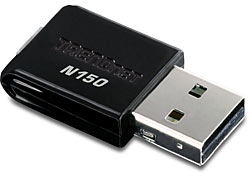
The 150Mbps Mini Wireless N USB Adapter connects a laptop or desktop computer to a wireless n network at up to 6x the speed and 3x the coverage of a wireless g connection.
Enjoy proven wireless n speed and reliability in an ultra compact design that is slightly larger than a US penny.
Setup is a breeze with one-touch Wi-Fi Protected Setup (WPS) technology. Advanced wireless encryption protects your valuable data. Wi-Fi Multimedia (WMM) Quality of Service (QoS) prioritizes important video, audio and gaming traffic. Seamlessly stream video, download files, play games and talk online with this ultra compact wireless n adapter.
*Maximum wireless signal rates are referenced from IEEE 802.11 theoretical specifications. Actual data throughput and coverage will vary depending on interference, network traffic, building materials and other conditions.
*Maximum wireless signal rates are referenced from IEEE 802.11 theoretical specifications. Actual data throughput and coverage will vary depending on interference, network traffic, building materials and other conditions. | ||||||||||||||||||||||||||||||||||||||||||